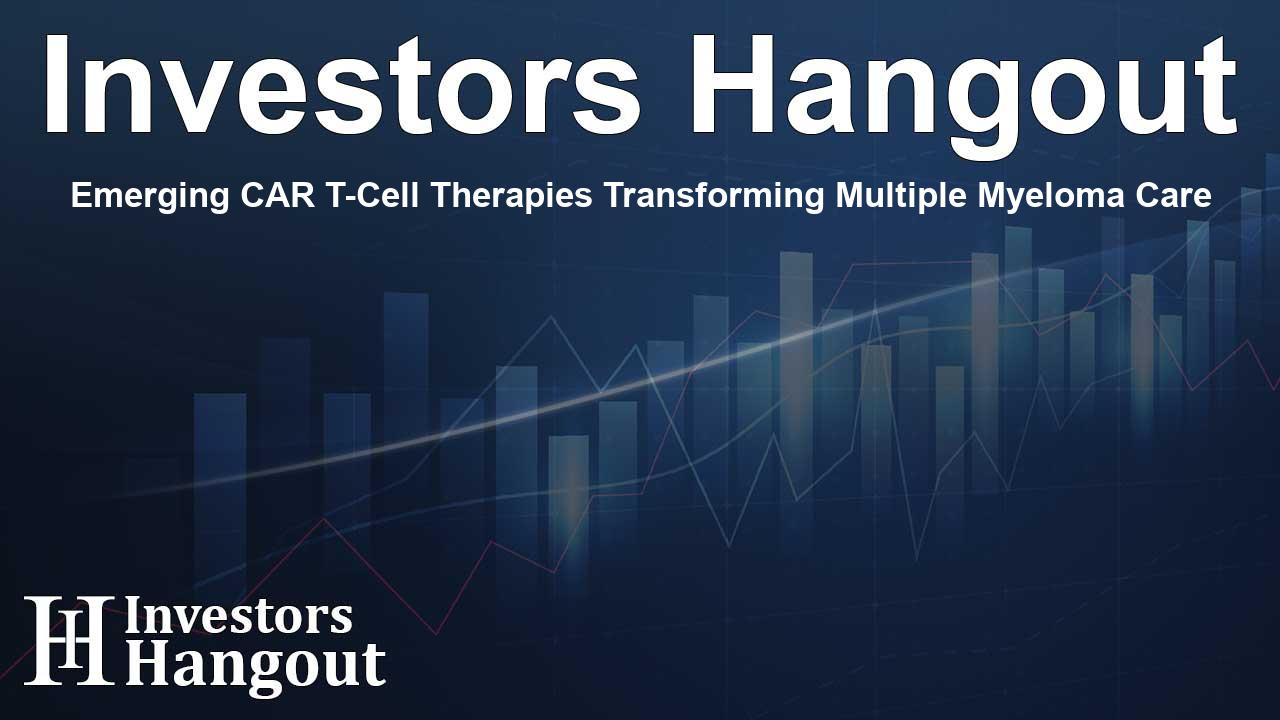Emerging CAR T-Cell Therapies Transforming Multiple Myeloma Care

Advancements in CAR T-Cell Therapy for Multiple Myeloma
In recent years, CAR T-cell therapy has emerged as a revolutionary treatment for multiple myeloma, a complex cancer of the plasma cells. Research and development in this area have accelerated, leading to new therapies that enhance effectiveness and patient outcomes.
Market Trends and Growth Drivers
The global market for CAR T-cell therapies is poised for significant growth due to various factors, including increased incidence rates of multiple myeloma, ongoing clinical trials, and robust investments in innovative treatments. Enhanced understanding of the disease's biology has propelled the advancement of specific therapies that target B-cell maturation antigen (BCMA), presenting new hope for many patients.
Rising Case Rates Influencing Market Demand
The rise in multiple myeloma cases globally has been a critical factor driving the demand for CAR T-cell therapies. For instance, the United States has recorded over 32,000 new multiple myeloma cases annually, underscoring the urgent need for effective therapeutic options. As projected, the number of cases is expected to grow, increasing market potential by 2034.
Innovations in Treatment Options
Recent advancements in BCMA-targeted CAR T-cell therapies, such as those developed by leading companies like Bristol Myers Squibb and Johnson & Johnson, have shown promising efficacy in patients with relapsed or refractory multiple myeloma. These therapies have achieved high response rates among patients who have exhausted standard treatment options, enhancing the overall treatment landscape.
Competitive Landscape of CAR T-Cell Therapies
The competitive landscape is bustling with several key players actively developing CAR T-cell therapies for multiple myeloma, including Arcellx, Kite, Juno Therapeutics, and Poseida Therapeutics. Their commitment to addressing unmet needs in multiple myeloma treatment has resulted in a diverse range of therapies in various stages of development.
Clinical Trials Driving Innovations
Clinical trials for CAR T-cell therapies are critical for the ongoing evolution of treatment. Therapies such as anitocabtagene autoleucel are currently undergoing significant testing, showing great promise in improving patient outcomes. The data from these trials not only contribute to regulatory approvals but also help solidify the position of innovative therapies in the market.
Emerging Therapies to Watch
Some exciting therapies to watch include Arlocabtagene autoleucel and Zevor-cel, which are set to enter the market soon. As these therapies gain regulatory approval, they are expected to redefine treatment protocols for multiple myeloma, leading to improved patient experiences and outcomes.
Future Outlook of the CAR T-Cell Market
The future of CAR T-cell therapy for multiple myeloma looks promising as ongoing research continues to yield new insights and therapeutic strategies. By focusing on innovative treatments, the landscape for managing multiple myeloma is evolving, highlighting the importance of continuous investment in research and clinical trials.
Frequently Asked Questions
What is CAR T-cell therapy?
CAR T-cell therapy is an innovative treatment that modifies a patient’s T-cells to recognize and attack cancer cells. This personalized approach shows great promise in treating various cancers, including multiple myeloma.
How common is multiple myeloma?
Multiple myeloma is considered a rare blood cancer, but its incidence is rising, especially in older individuals. In some regions, thousands of new cases are diagnosed each year, highlighting the need for effective treatments.
What companies are leading in CAR T-cell therapy development?
Some of the notable companies leading the CAR T-cell therapy space include Arcellx, Kite, Juno Therapeutics, and Bristol Myers Squibb, focusing on next-generation therapies that target specific cancer cells.
What are some challenges associated with CAR T-cell therapy?
Despite its promise, CAR T-cell therapy can have significant side effects, including cytokine release syndrome. Additionally, its high cost and complex manufacturing processes pose challenges to accessibility.
Where can I find more information on clinical trials for CAR T-cell therapies?
Detailed information on upcoming and ongoing clinical trials for CAR T-cell therapies can be found through specialized medical databases and health organization websites focused on cancer research and treatment.
About The Author
Contact Kelly Martin privately here. Or send an email with ATTN: Kelly Martin as the subject to contact@investorshangout.com.
About Investors Hangout
Investors Hangout is a leading online stock forum for financial discussion and learning, offering a wide range of free tools and resources. It draws in traders of all levels, who exchange market knowledge, investigate trading tactics, and keep an eye on industry developments in real time. Featuring financial articles, stock message boards, quotes, charts, company profiles, and live news updates. Through cooperative learning and a wealth of informational resources, it helps users from novices creating their first portfolios to experts honing their techniques. Join Investors Hangout today: https://investorshangout.com/
The content of this article is based on factual, publicly available information and does not represent legal, financial, or investment advice. Investors Hangout does not offer financial advice, and the author is not a licensed financial advisor. Consult a qualified advisor before making any financial or investment decisions based on this article. This article should not be considered advice to purchase, sell, or hold any securities or other investments. If any of the material provided here is inaccurate, please contact us for corrections.
